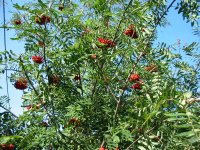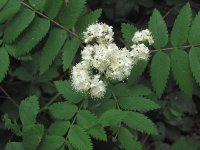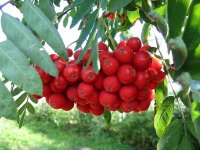Ashberry - sorbus aucuparia
Family Rosaceae.
Botanical characteristics. The tree is up to 20 m high. Leaves are regular, odd-pinnate, with 7 - 15 oblong or oblong-lanceolate, serrate leaves, on top - matt-green, from below - gray. Flowers are bisexual, regular, 5-petalled, white, in dense multicolor scutellium inflorescence. Fruit - apple-like, globular, bright red or orange-red. Blooms in May. Ripen fruit in September.
Spread. In the CIS countries, more than 30 species of mountain ash are now grown.
A tree grows in the woods, among shrubs, in parks, in plantings along the roads, along the banks of rivers and lakes. Cultivated for decorative landscaping of cities.
Chemical composition. In leaves of mountain ash ordinary contains a large amount of vitamin C, carotenoids and phenolic compounds. Flowers contain quercetin-3-glycoside, quercetin-3-sophoside, substances that strengthen the vascular wall of the capillaries.
Fruits are rich in phenolic bases, catechins, anthocyanins, flavonols, as well as carotene, folic acid, ascorbic acid, vitamin K, E, B3. The fruits of mountain ash contain many organic acids (succinic, malic, tartaric, oxalic, sorbic, parasorbic, citric), sugars (fructose, glucose, sucrose, sorbose), pectin, tannins, mineral salts (iodine, iron, manganese, potassium, sodium , Calcium, magnesium, aluminum).
Used parts of the plant. With therapeutic purpose, fruits, flowers and leaves of mountain ash are used. Dry fruits are harvested and dispensed pharmacies, flowers and leaves are used in folk herbal medicine and phyto-diet.
Application in medicine. In folk medicine, mountain ash is known as fortifying, vitamin, vasodilating, sugar-reducing, hemostatic, choleretic, diuretic, analgesic, estrogenic. It has cholesterol-lowering, anti-scabic action, improves metabolism and increases resistance to excessive radiation doses.
The polyvitaminic composition of the rowan fruits determines their use by anemia, diabetes mellitus, capillarotoxicosis and capillaropathies of various origins (including radiation), hemorrhoids, kidney and liver diseases, and gastrointestinal tract.
Rowberry juice is useful for exhaustion, as an appetizing and vitamin remedy, it is drunk for violations of salt metabolism, gout, thrombophlebitis, atherosclerosis, and decreased acidity of gastric juice. Juice and decoction of fruits takes with diarrhea, atony of the large intestine in the elderly, with tare diabetes, as a choleretic agent in diseases of the liver, gall bladder, cholelithiasis, and also as a diuretic in diseases of the kidneys, kidney stones, kidney colic.
Infusion of flowers of mountain ash, juice and decoction of fruits and leaves are effective as a diaphoretic for catarrhal diseases, fever, and with abundant menstruation, uterine, nasal bleeding, in the climacteric period, use it as a contraceptive.
Juice from berries, natural berries and decoction of fruits are used to help get burnt from carbon monoxide, and also as an analgesic for pains in the stomach, intestinal colic, malignant tumors. Infusion of flowers of mountain ash - antiparretic and antitussive.
In order to better preserve the potatoes, it is for the winter poured finely chopped leaves of mountain ash. Tubers do not rot. Phytoncides of mountain ash have a strong disinfecting effect. In the field, rowan is used for disinfection of standing water, for which the sprig of mountain ash is lowered for several hours into dishes with water, while the taste of water also improves.
Contraindications. With a tendency to increased blood clotting, the use of fruits of mountain ash is contraindicated.
Preparation
- Infusion of flowers of mountain ash ordinary: 1 tsp. Dry flowers pour 1 cup boiling water and boil 1 min. Insist 1 hour, filter. They drink warmly on a quarter of a glass 3-4 times a day for goitre, diabetes, colds, menopause.
- Infusion of leaves of mountain ash ordinary: 1 tbsp. L. Fresh crushed leaves pour 1 cup boiling water and insist under the lid in a warm place for 1 hour. Filter and drink with periodontal disease, scurvy, avitaminosis, anemia.
- Infusion of fruits of mountain ash ordinary: 1 tbsp. L. Crushed dried fruit or 1 tbsp. L. Gruel from fresh mashed fruits pour 1 glass of boiling water and insist 4 hours, and then filter. Drink 0.5 cup 3 times daily before meals with diabetes, goitre, beriberi, stomach pain and intestinal colic, impaired liver or kidney function.
- Decoction of fruits of mountain ash ordinary: 1 tbsp. L. Dry crushed fruits pour 300 ml of water and boil for 10 minutes, insist in a warm place for 1 hour. Filter and drink 3 times a day before meals with avitaminosis, anemia, menopause, goiter, diabetes, after radiation exposure.
- Decoction of fruits and leaves of mountain ash: Take a dessert spoon of mashed fresh fruits and the same number of leaves and boil in 300 ml of water 10 minutes. Insist 2 hours, filter. Take a quarter cup 2 - 3 times daily before meals with diabetes, after radiation exposure.
- Decoction from the bark of ashberry ordinary: Dessert spoon of crushed dry bark poured 300 ml of water and boiled for 15 minutes, and then insisted 6 hours in a thermos. Filter and take 2 tablespoons. L. 3 times a day with hypertension, atherosclerosis, menopause.
- Tincture of fresh fruits of mountain ash ordinary: A glass of mashed fresh fruits pours 1 liter of vodka and insist 2 weeks in a dark place at room temperature. Filter and take 1 tsp. 3 times a day with menopause, goiter, impotence in diabetic patients.





Comments
When commenting on, remember that the content and tone of your message can hurt the feelings of real people, show respect and tolerance to your interlocutors even if you do not share their opinion, your behavior in the conditions of freedom of expression and anonymity provided by the Internet, changes Not only virtual, but also the real world. All comments are hidden from the index, spam is controlled.